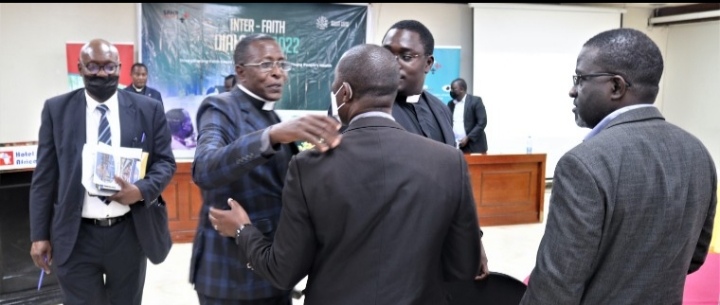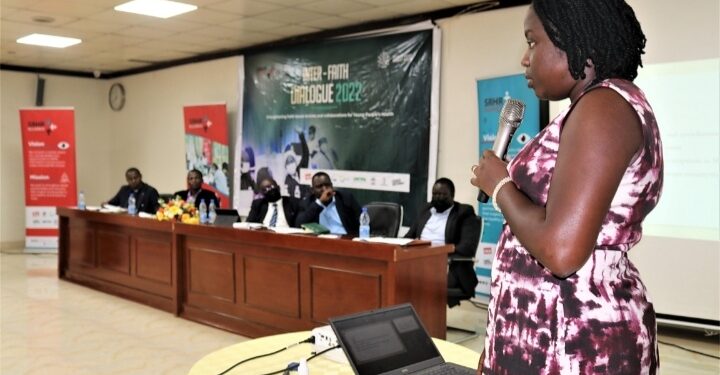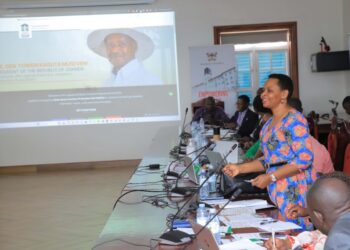By Sandra Umutesi
“Teach young people how to behave, make good friends, and provide them with information so that they can understand moral values and norms if we are to reduce teenage pregnancies and sexual promiscuity among Ugandan youth.”
This is according to Rev. Canon Evatt Mugarura,a sexual reproductive health and rights champion in Uganda, who was joined by other religious leaders from Islam, Christian, and Born-Again Faith (BAF), governments’ ministries’ officials and civil society actors at the 2022, Inter-Faith dialogue in Kampala under the theme: Strengthening Faith-Based Actions and Collaborations for Young People’s Health.
During the event, religious leaders, who are supported by civil society actors, argued that if stakeholders invest time in improving young people’s access to reproductive health information, those aged 10 to 25 will not become parents at a young age, or drop out of school.
Uganda’s maternal Mortality Ratio (MMR) stands at 336 deaths per 100,000 live births and regarding the maternal mortality rates, 17.2 percent of the deaths were among those aged 15-19.

According to the Uganda Bureau of Statistics UBOS (2018), almost a quarter (one in four or 25%) of Ugandan women has given birth by the age of 18.
The National Planning Authority-NPA projected that by 2022, more than 30 percent of the 15 million learners who were in school before the COVID-19 pandemic hit Uganda would not return. This tallies with what Performance Monitoring for Action Uganda found in their new study that 46% of Women in Uganda say they had unintended pregnancies in 2021.
The percentage translates to 4.5 million students at various levels of education.
Sheikh Mohammed Ali Aluma,the Secretary for Social service at the Uganda Muslim Supreme Council (UMSC) said because schools are a safe place for children to understand sexual and reproductive health (SRH) issues, the Uganda Muslim Students Association (UMSA) have been empowered by the Uganda Muslim Medical Bureau (UMMB) to provide appropriate SRH information to students by trained and skilled persons.
“Following the COVID-19 shutdown, the Uganda Muslim Supreme Council and Inter-Religious Council learnt that schools are not only the safest and greatest locations to retain a kid, but also empower them to prevent early sex, undesired pregnancy, and sexually transmitted illnesses,” Aluma disclosed.

But Rev. Nathan Balirwana Mugalu, a counseling psychologist, health and adolescent mentoring specialist, believes that religious leaders should not shun talking about condoms to sexually active young people in Uganda. He noted that the family planning method can also prevent sexually active young people from catching diseases.
“Many people perceive condoms as promiscuity, yet they save lives among young sexually active people, HIV/ AIDS discordant couples,” Rev. Balirwana said at the 2022 Inter Faith Dialogue.
Charles Owekmeno, a National Coordinator at SRHR Alliance said, “We can help young people in accessing health services, by investing in religious leaders.”
Owekmeno feels that religious leaders, as well as communal, political, and cultural leaders, are better suited to preach the message of access to health care for teenagers because they are informed, reach out to communities, and advise people.
The government has also come up to support what Civil Society Organizations and religious leaders are fronting.
According to Dr. Justine Nabwire of the Ministry of Health’s Division of Adolescent and School Health, a multifaceted strategy is required for young people to have access to excellent health.
“We need a multifaceted strategy to dealing with adolescent-related health concerns, emphasizing the fact that many boys are sexually assaulted but find it difficult to notify the abusers,” Dr. Nabwire said.
According to the Uganda Bureau of Statistics, teenagers account for 34.8 percent of Uganda’s population of 48 million people.
According to Henry Semakula, an Education Officer at the Ministry of Education and Sports (MoES), specific services, including immunization, vaccination, and school-based testing, should be offered to these teenagers.
“We will collaborate with religious leaders, institutions and government to provide appropriate information and health services, such as immunization, vaccination, and testing, to our children in schools,” Semakula said.
The SRHR Alliance hosted the 2022 Inter-Faith conversation in Kampala in partnership with Reproductive Health Uganda (RHU) as part of the Right Here, Right Now -II Coalition Uganda, which involves five other coalition members.
Do you have a story in your community or an opinion to share with us: Email us at editorial@watchdoguganda.com













